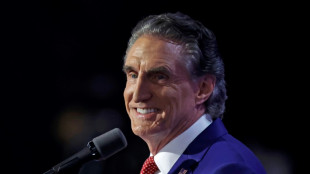

Euro strikes fresh 20-year low as eurozone economy shrinks again
The euro dived Tuesday to a new two-decade dollar low and equities wavered, as data highlighted the shrinking eurozone economy and the worsening energy crunch.
The single currency, hit also by the US Federal Reserve's rate-hiking plans before this week's hotly-awaited comments from Chair Jerome Powell, tumbled to $0.9901.
The shared unit had already plunged below parity Monday on recession fears to plumb the lowest levels since 2002, when it came into physical circulation.
In the latest blow, S&P Global's closely-watched monthly composite purchasing managers' index (PMI), which measures corporate confidence, languished in August below the key 50-point level.
That stoked long-running worries of a protracted economic downturn.
- 'Overarching threat' -
"Eurozone PMIs ... confirm concerns of an impending recession in Europe on the back of high inflation and energy crunch, as they signal declining activity for two months in a row," warned Citi analyst Luis Costa.
He added: "The energy crunch remains an overarching threat to economic stability in Europe."
Equities in the region wavered amid stubborn worries that the US Federal Reserve will carry on ramping up interest rates to fight inflation.
Rising US interest rates also push the dollar higher against other currencies.
On Tuesday, natural gas prices remain elevated on fears over a temporary halt to Russia's gas deliveries to Europe.
The Dutch TTF Gas Futures contract stood at 274.50 euros per megawatt hour, although this was down slightly from Monday.
Gas had spiked to record peaks in March after key producer Russia launched its invasion of neighbouring Ukraine.
That has sparked surging domestic energy bills, fuelling decades-high inflation that has prompted tighter monetary policy around the world.
- 'More effective than Kalashnikovs' -
"As it has become painfully obvious, natural gas is a much more effective weapon in the hands of Russian politicians than the Kalashnikov in the hands of their soldiers," noted PVM analyst Tamas Varga.
This has hit the single currency hard because the bloc relies heavily on imported Russian gas, indicated Societe Generale analyst Kit Juckes.
Fears increased after Russia's Gazprom said Friday that the Nord Stream pipeline would be closed for maintenance at the end of the month, cutting Europe's crucial gas deliveries.
"The euro's problem is ... the threat from continued squeezing of gas supplies and the cost of replacing Russian gas," Juckes said.
Asian markets fell again Tuesday as traders grew increasingly jittery over rising US rates.
Wall Street fell deep into the red on Monday with the S&P 500 and Nasdaq both off more than two percent.
With the Jackson Hole symposium of central bankers and finance chiefs taking place this week, the focus is on what Fed chief Jerome Powell says about its plans to tackle prices, with many fearing officials could send the economy into recession.
Oil prices -- which have fallen for weeks as recession worries hit demand expectations -- rebounded after Saudi Arabia suggested OPEC and other major producers could cut output citing "volatility" in crude markets.
- Key figures at around 1100 GMT -
London - FTSE 100: DOWN 0.3 percent at 7,510.01 points
Frankfurt - DAX: UP 0.1 percent at 13,243.90
Paris - CAC 40: FLAT at 6,376.74
EURO STOXX 50: UP 0.1 percent at 3,660.73
Tokyo - Nikkei 225: DOWN 1.2 percent at 28,452.75 (close)
Hong Kong - Hang Seng Index: DOWN 0.8 percent at 19,503.25 (close)
Shanghai - Composite: DOWN 0.1 percent at 3,276.22 (close)
New York - Dow: DOWN 1.9 percent at 33,063.61 (close)
Euro/dollar: DOWN at $0.9930 from $0.9943 Monday
Pound/dollar: DOWN at $1.1764 from $1.1767
Euro/pound: DOWN at 84.39 pence from 84.98 pence
Dollar/yen: DOWN at 137.42 yen from 137.48 yen
West Texas Intermediate: UP 1.8 percent at $91.98 per barrel
Brent North Sea crude: UP 1.5 percent at $97.88
burs-rfj/lth
A.Gmeiner--MP




